Beirut explosion death toll: Australian killed in Lebanon blast
An Australian who barely escaped death in the Beirut explosion with his 28-year-old daughter has described the terrifying scenes on the ground.
Prime Minister Scott Morrison says an Australian has died in the explosion that rocked Lebanon’s capital, Beirut, overnight.
The death toll from the blast currently stands at 72, according to the Lebanese Health Minister, and it is set to keep rising sharply in the coming hours. More than 4000 people have been injured.
The explosion tore down buildings, flattened houses, ripped balconies from apartments, tossed cars from the nearby motorway and sent a huge plume of smoke billowing across the city.
RELATED: Huge explosion rocks Lebanon’s capital city
Appearing on Sunrise this morning, Mr Morrison said there was no information yet on what caused the tragedy, but confirmed he had received briefings overnight.
“There are normally around 20,000 Australians there at any time. We couldn’t say, because of COVID-19 restrictions, how many returned,” said the Prime Minister.
“It is very distressing, and I can confirm there has been one Australian that has been killed, which is terribly devastating.
“We can’t give more details on the specifics at this time, but our sympathies to all of the people in Lebanon. There is a large Lebanese-Australian community here and they would be worried about loved ones. The details will hopefully be provided soon.”
Mr Morrison said the Australian embassy in Beirut had been “significantly impacted” by the blast, but all of its staff were well, aside from some “cuts and scratches”.
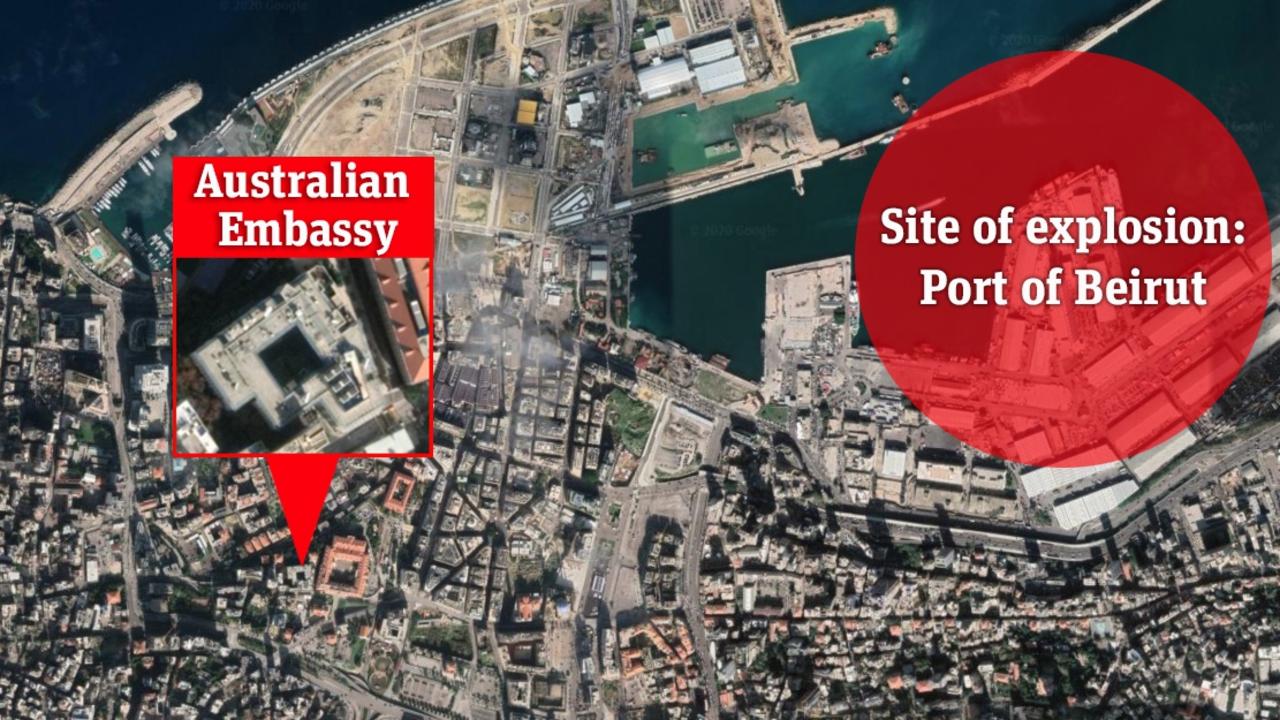
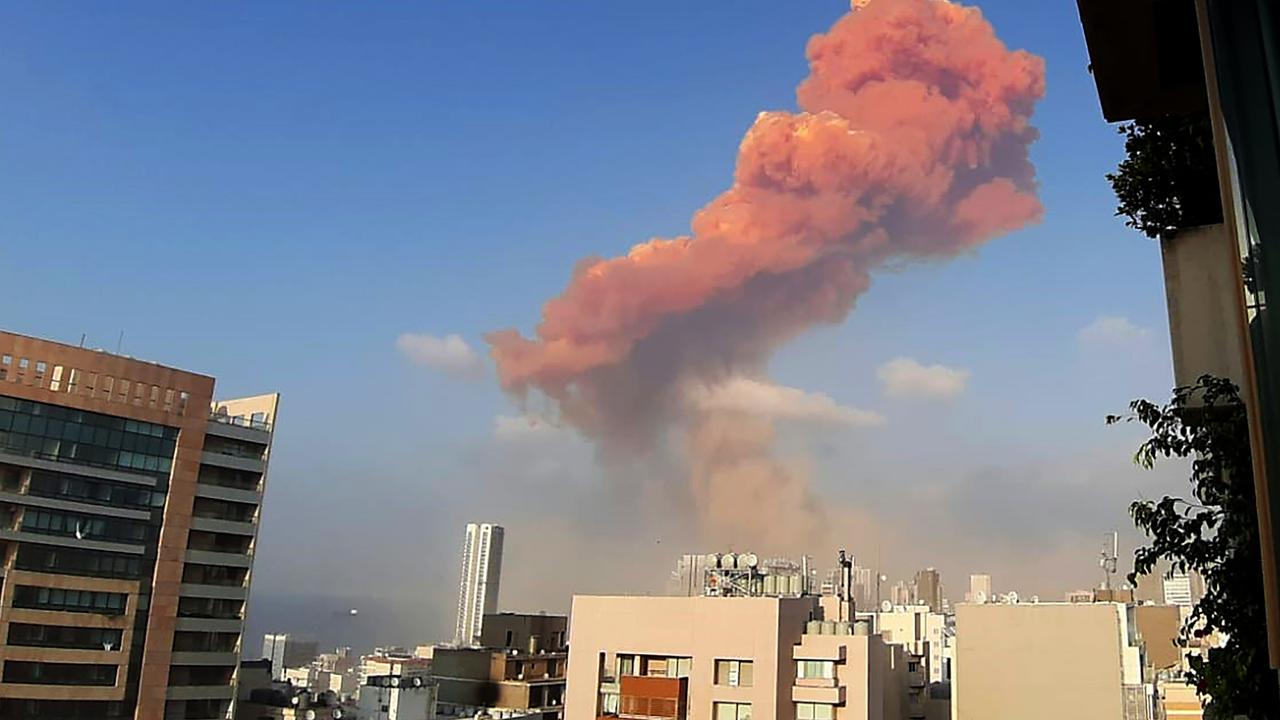
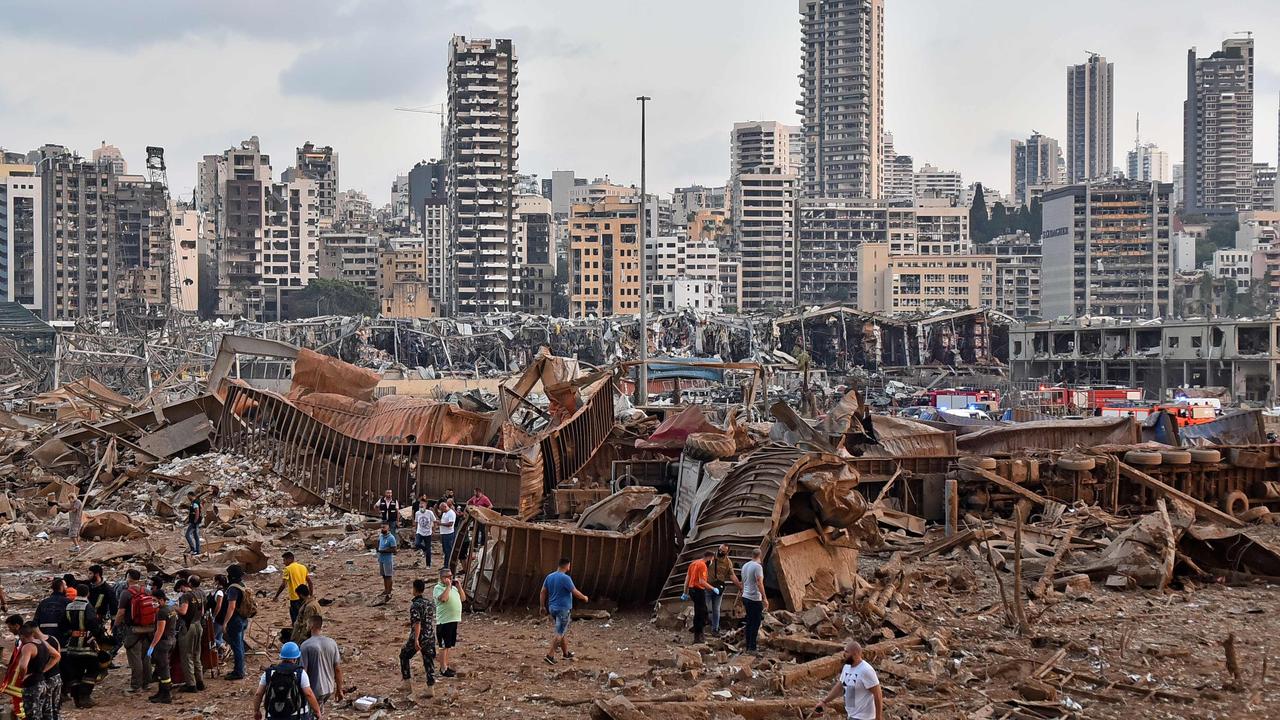
Foreign Minister Marise Payne went into more detail on 2GB radio.
“The Australian embassy has been considerably impacted. We had, I am advised by the ambassador, about 95 per cent of our windows blown out by the impact,” Ms Payne said.
“A number of staff have received glass injuries. They are being suppored and looked after. Thankfully none of those injuries are very serious.
“But of course, it’s a shocking and terrifying incident to be dealing with and I really send our thoughts to our teams who are on the ground in Beirut, including Ambassador Rebekah Grindlay.”
Speaking to News Corp Australia, a Sydney man who barely escaped death from the blast with his 28-year-old daughter has described the chaos on the ground.
The pair ran out of the cafe where they were having coffee after hearing the first of two explosions.
“I said to my daughter and friends, ‘Duck.’ I heard something like an aeroplane, I thought there was going to be an attack,” he said.
“I saw this big white wave come towards us. The explosion was deafening. Then we heard the buildings collapsing one after another. The noise was deafening.
“The explosion came from the other side of the cafe. The chairs where we were sitting were gone. The tables were gone everything inside was just gone.
“I have seen hell today. People are walking the streets like zombies
“We are now driving around giving out water and taking pallets of water and medication to the hospitals. They don’t have enough supplies for their staff.”
On Channel 9’s Today program, Mr Morrison urged any Australians concerned about their family members to call +61 2 6261 3305.
“Our hearts really go out to the Lebanese-Australian community. I know there will be many prayers in the churches and the mosques in Australia, but again, given the COVID restrictions, I would just urge the appropriate response,” said Mr Morrison.
“Those private prayers this morning will be the ones that people will be offering, and so will I.”
Terrible scenes out of Beirut after a major explosion. Our hearts go out to those caught up in this tragedy and to our Australian Lebanese community waiting to hear from their loved ones. Australia stands ready to provide our support, including to any Australians affected.
— Scott Morrison (@ScottMorrisonMP) August 4, 2020
Shocked and saddened by the massive explosion in Beirut. Our hearts go out to all affected & to all Lebanese Australians worried for loved ones today. If you need urgent help, call +61 2 6261 3305. For info follow @Smartraveller
— Marise Payne (@MarisePayne) August 4, 2020
Today also spoke to senior CNN correspondent Ben Wedeman, who is in Beirut.
“Basically it was like an earthquake. In fact, that is what I thought it was initially, because this is an earthquake zone,” Wedeman said.
“But just a millisecond later, the windows were blown in, the window frames were blown inside the bureau, and I just heard smashing, shattering glass for sort of 360 degrees around me.
“I looked out the window, there is a huge pile of red smoke floating overhead from the direction of the port, which is only about a kilometre, more or less, from this location. I saw all the buildings around us had suffered similar damage.
“But we were relatively lucky. There are some neighbourhoods where buildings have collapsed.”
Host Allison Langdon asked him “just how big an area” the devastation had affected.
“It’s the entire city,” said Wedeman.
“I’ve spoken with people to the west, to the east, and everyone is reporting that damage occurred to their homes.
“I spoke to one woman who lives in my neighbourhood, in the western part of the city, who said that she was here throughout the civil war, throughout the 2006 war between Israel and Lebanon, and in all of that time she has never seen a blast as large and as destructive as the one that happened this evening.
“As far as the hospitals go, they’re all damaged. But they’re still doing their best to treat people. Sometimes they have to do it in the parking lot, just given the sheer number of people there.
“Definitely this is something the scale of which this city has never seen.”
He said the death toll was “only going to continue to increase”.

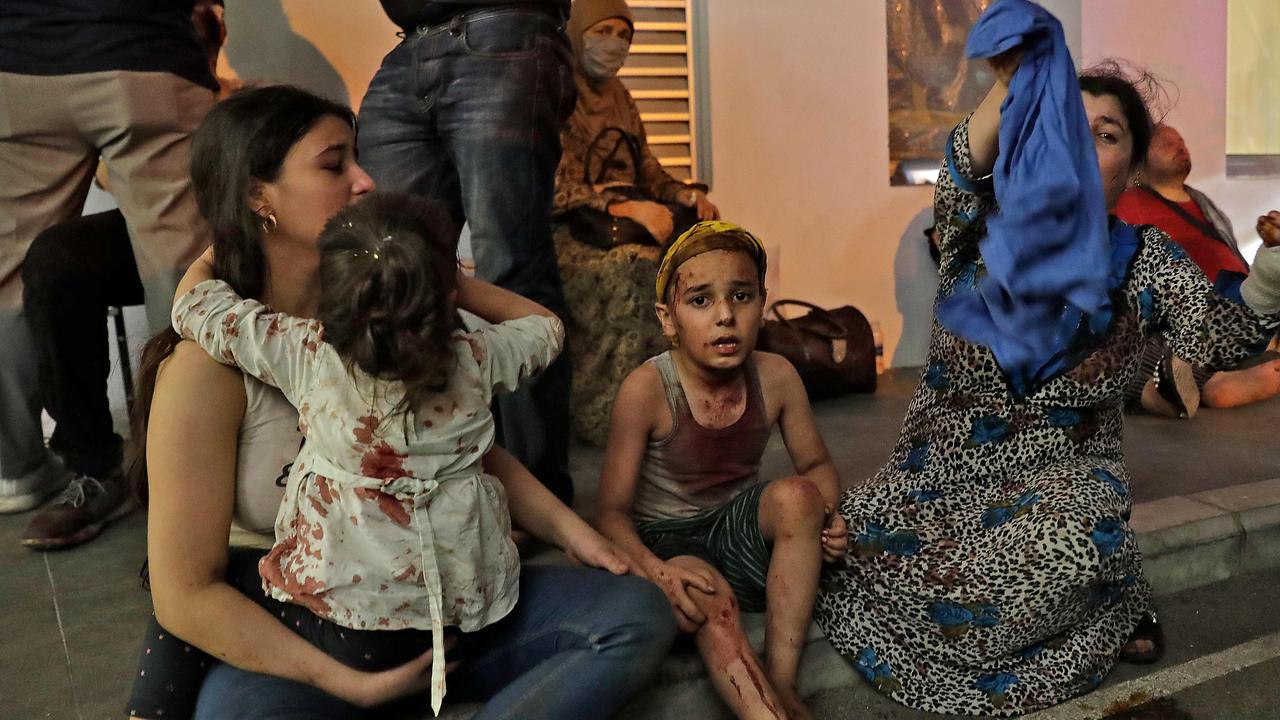
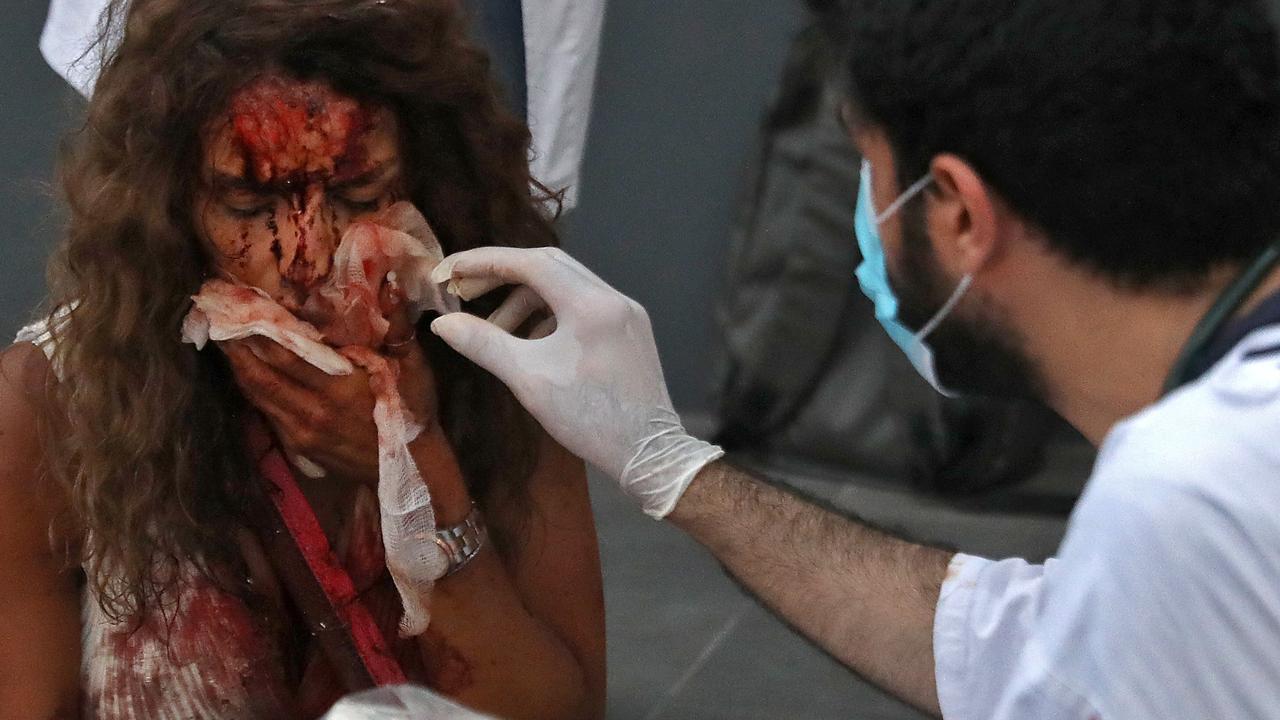
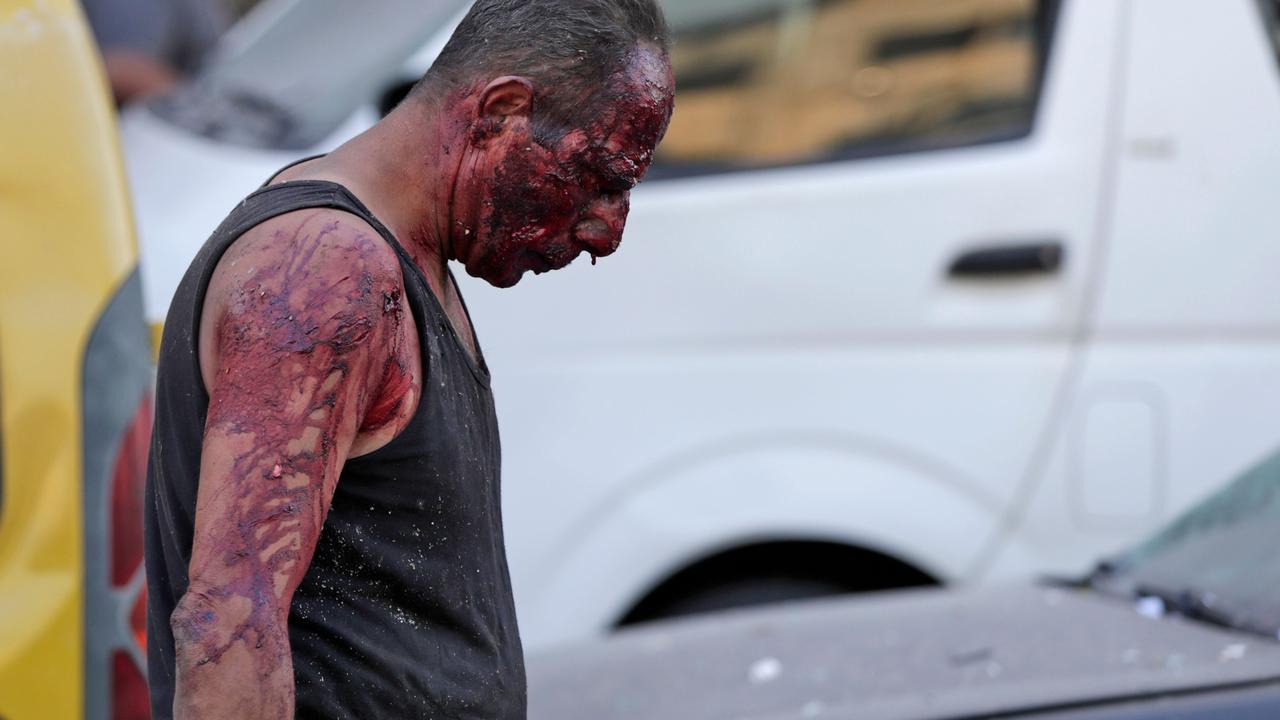
Shocked Beirut City Governor Marwan Aboud said his city was in the midst of a “national disaster akin to Hiroshima’’.
Lebanese media carried images of people trapped under rubble, some bloodied, after the explosion.
“All the buildings around here have collapsed. I’m walking through glass and debris everywhere, in the dark,” one witness told AFP.
It is not yet clear what caused the explosion, but videos show smoke rising from a fire before it happened. There were also reports of a second explosion.
Many hospitals in the Beirut are now overwhelmed. A BBC reporter at one of them said patients were being treated in the hallways and there were blood stains on the walls.
Two hospitals have been evacuated because of the severe damage – one of which was treating coronavirus patients – and many in the city have been experiencing power outages.
Lebanon’s Prime Minister Hassan Diab said 2750 tonnes of ammonium nitrate were being stored in a warehouse at the port before the explosion. He said this was “unacceptable”.
“I will not rest until we find the person responsible for what happened so we can hold them to account and impose the most severe punishment,” the prime minister was quoted as saying by an official Twitter account.
“It is unacceptable that a shipment of 2,750 tonnes of ammonium nitrate has been present for six years in a warehouse, without taking preventive measures and endangering the safety of citizens”.
Local media reports the chemicals were seized from a sinking ship more than a decade ago.




